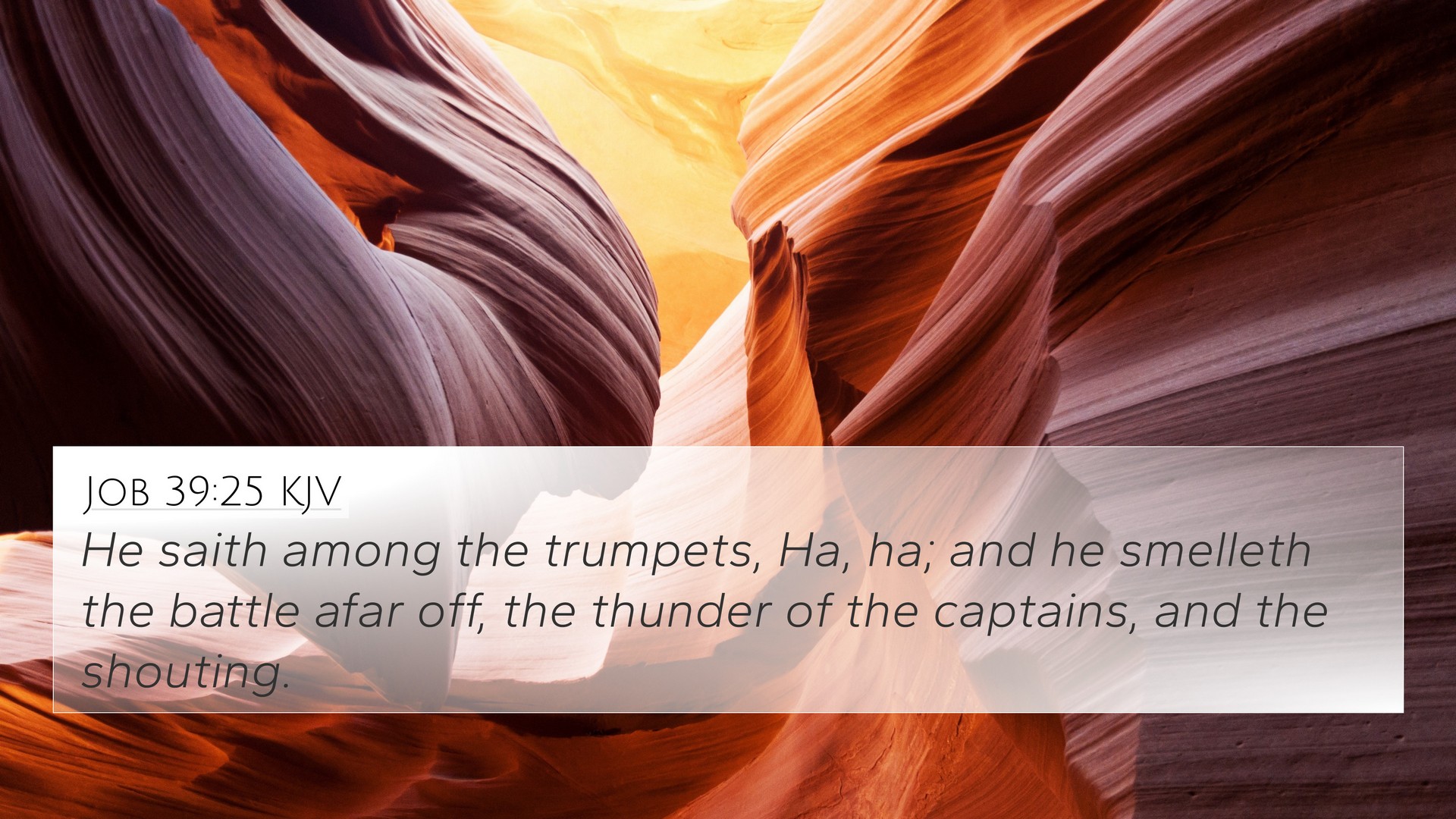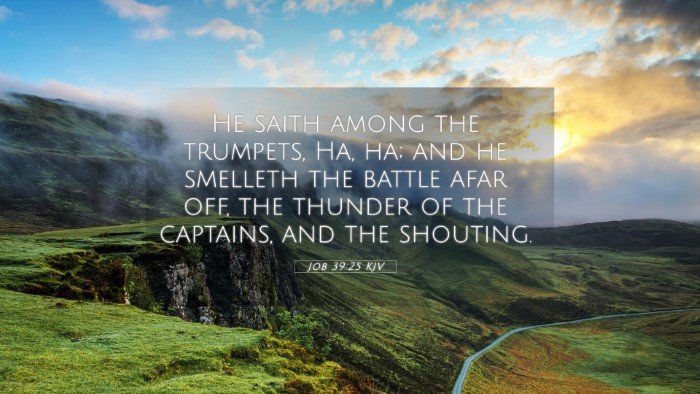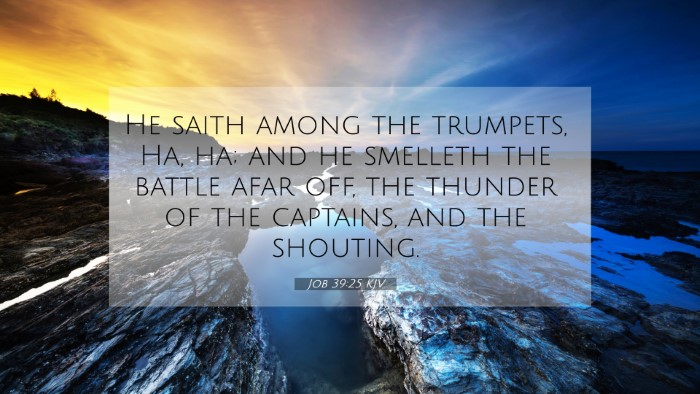Old Testament
Genesis Exodus Leviticus Numbers Deuteronomy Joshua Judges Ruth 1 Samuel 2 Samuel 1 Kings 2 Kings 1 Chronicles 2 Chronicles Ezra Nehemiah Esther Job Psalms Proverbs Ecclesiastes Song of Solomon Isaiah Jeremiah Lamentations Ezekiel Daniel Hosea Joel Amos Obadiah Jonah Micah Nahum Habakkuk Zephaniah Haggai Zechariah MalachiJob 39:25 Similar Verses
Job 39:25 Cross References
He saith among the trumpets, Ha, ha; and he smelleth the battle afar off, the thunder of the captains, and the shouting.
Uncover the Rich Themes and Topics of This Bible Verse
Listed below are the Bible themes associated with Job 39:25. We invite you to explore each theme to gain deeper insights into the Scriptures.
Job 39:25 Cross Reference Verses
This section features a detailed cross-reference designed to enrich your understanding of the Scriptures. Below, you will find carefully selected verses that echo the themes and teachings related to Job 39:25 KJV. Click on any image to explore detailed analyses of related Bible verses and uncover deeper theological insights.
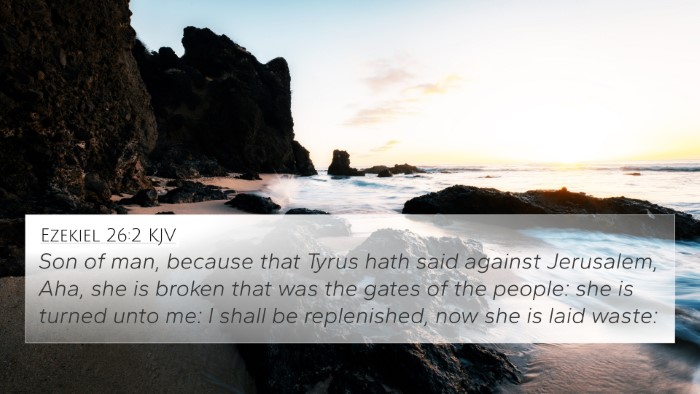
Ezekiel 26:2 (KJV) »
Son of man, because that Tyrus hath said against Jerusalem, Aha, she is broken that was the gates of the people: she is turned unto me: I shall be replenished, now she is laid waste:
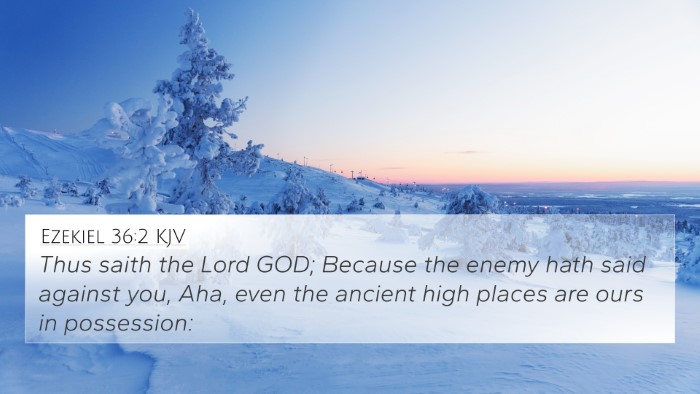
Ezekiel 36:2 (KJV) »
Thus saith the Lord GOD; Because the enemy hath said against you, Aha, even the ancient high places are ours in possession:
Job 39:25 Verse Analysis and Similar Verses
Understanding Job 39:25
Job 39:25 states: "At the sound of the trumpet, he saith, Aha! And he smelleth the battle afar off, the thunder of the captains, and the shouting." This verse reflects a crucial moment in the dialogue of the book of Job, illustrating the awareness and instinct of a creature created by God, specifically the horse, in anticipating battle and recognizing the sounds of war.
Verse Overview
The context of this verse is significant. It occurs within a series of questions posed by God to Job, intended to highlight Job's limited understanding compared to God's omniscience and omnipotence. The reference to the horse is not only about the animal's physical characteristics but also its symbolic representation of strength and the instinctual drive toward conflict.
Commentary Insights
Matthew Henry's Commentary
According to Matthew Henry, this verse illustrates the fierceness and readiness of the war horse, which seems to exhibit a sense of excitement at the prospect of battle. Henry emphasizes that God has created animals with instincts that reflect His design and purpose. The imagery of the horse responding to the sound of the trumpet signifies a deep-seated instinct inherent in creation, displaying both power and the potential for destruction.
Albert Barnes' Notes on the Bible
Albert Barnes notes that the phrase "smelleth the battle afar off" points to the horse's sensitivity to the sounds and scents associated with warfare. He explains that this reflects a warrior's spirit instilled by God, showcasing how even animals have an understanding of danger and conflict. Barnes suggests that this passage serves to remind us of the natural order and the instincts that drive God's creations.
Adam Clarke's Commentary
Adam Clarke expands upon the observation of the horse and its eagerness to rush into battle. He describes how the sound of the trumpet, a call to arms, evokes a passionate response from the horse, which can interpret this sound as an invitation to adventure and valor. Clarke points out how this excitement is metaphorical, representing a deeper understanding of human involvement in strife and conflict. His commentary invites readers to consider the broader implications of this passage in Job's context of suffering and divine purpose.
Thematic Connections
This verse can be linked thematically to several key themes throughout the Bible, including:
- The Sovereignty of God: The description of the horse's nature is a reflection of God's overarching power in creation.
- Human Conflict: The anticipation of battle by the horse can be seen as a parallel to humanity's own propensity toward conflict.
- Divine Design: The instincts given to creatures highlight God’s intricate design in nature, resonating with themes in Psalm 104:25-26.
Cross-References for Further Study
Job 39:25 has significant connections to several other verses in the Bible:
- Psalm 147:10-11: Highlights God’s pleasure not in the strength of the horse but in those who fear Him.
- Isaiah 31:1: Explores the futility of relying on horses and chariots versus trusting in God.
- Revelation 19:11-14: Presents the image of Christ on a conquering horse in the context of battle.
- Job 39:19: Discusses the strength of the horse as part of God's creation and His questions to Job.
- Jeremiah 8:6: Reflects on the awareness of creatures in understanding danger.
- 1 Peter 5:8: Advises believers to be vigilant, akin to the horse’s instinct in battle.
- Ecclesiastes 3:8: Addresses a time for war, similar to the themes found in Job concerning the realities of life.
Practical Applications
Understanding Job 39:25 can lead to various applications for believers today:
- Courage in Conflict: Like the horse, we are called to face battles in life with readiness and courage.
- Awareness of God’s Sovereignty: Recognizing that God controls all creation and its responses.
- Instincts and Purpose: Reflecting on how God has given us instincts and desires that align with His purposes.
Conclusion
In summary, Job 39:25 serves as a rich text for understanding the nature of creatures in God's creation and their symbolic representation of human struggles. The insights drawn from public domain commentaries by Matthew Henry, Albert Barnes, and Adam Clarke enhance our comprehension and promote a deeper study of the inter-Biblical dialogue, fostering a thematic exploration of courage, instinct, and divine orchestration in our lives.
For those interested in biblically cross-referencing, a deeper examination of this verse alongside its connections will yield insights into God's design and purpose in both creation and conflict.
